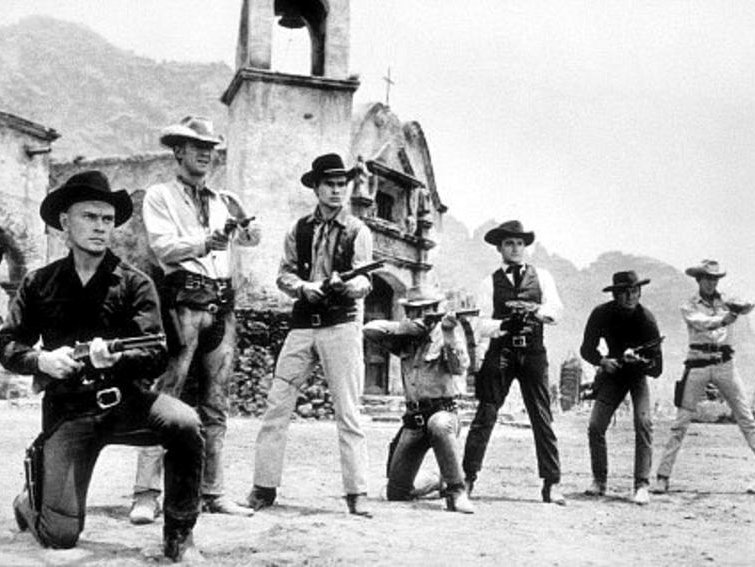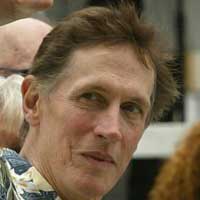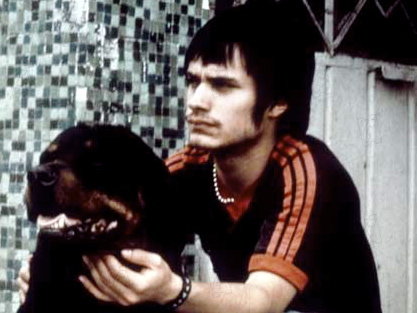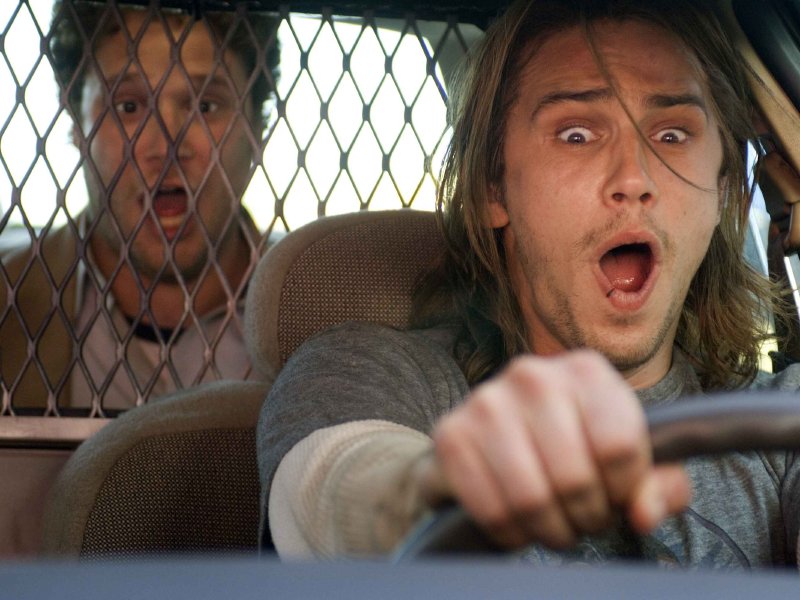Bayside resident Mark Metcalf is an actor who has worked in movies, TV and on the stage. He is best known for his work in "Animal House," "Buffy the Vampire Slayer" and "Seinfeld."
In addition to his work on screen, Metcalf is involved with Milwaukee Film, First Stage Children's Theater and a number of other projects, including comicwonder.com.
He also finds time to write about movies for OnMilwaukee.com. This week, Metcalf weighs in on the theme of "Men in Movies," based on classics like "The Professionals," "The Magnificent Seven" and "The Wild Bunch."
THE PROFESSIONALS (1966)
I grew up in the ‘1950s and ‘60s, so the men I grew up with were Lee Marvin, Burt Lancaster, Kirk Douglas and what was left of John Wayne. I got John Garfield, Jimmy Stewart and Henry Fonda a little later, in college and later, when I started really studying movies.
Those other guys didn't seem to be quite the men that Lancaster was, that Marvin was. Lancaster was just wrong in a suit. Marvin could wear one but he needed a narrow tie and a tight, hipster suit, shiny from wear, cheap, like the one he lives in in "Point Blank."
Someone once said of Jack Nicholson after his performance in "Five Easy Pieces" that he was of that generation of men who had guys like Gary Cooper, Burt Lancaster, and Kirk Douglas to live up to. They were what it meant to be a man, and if being a man meant anything to you, that's what you had to be. Nicholson shows it in every performance he's ever done. I don't know if it's entirely true, but if you look you can see almost anything. You just have to look at it the right way.
"The Professionals" is directed by Richard Brooks. It stars, in addition to Marvin and Lancaster, Robert Ryan, the darker, disturbed, perhaps more sensitive, but certainly more wounded man's man, and Woody Strode, who is just plain beautiful, and I don't mind saying it. Claudia Cardinale was making her Hollywood debut in the midst of a successful career in Italy, and a Mexican actress, Maria Gomez, plays Chiquita. Jack Palance plays the bad guy who turns out to be the good guy, but... oh shucks, I gave it away.
So, there's not only plenty of testosterone but also beautiful Latin women to make the testosterone flow. But, it's not really that kind of movie.
"The Professionals" is about professionals doing a job, and from the way that it is made it is obvious that professionals made it. That it is work that they love and do extremely well is both to their benefit and ours because their sense of fun, and the enjoyment of danger, and of work well done is in every frame.
These men are so confident in their lives and in their work that two of them, Palance and Lancaster, can lie in the heat of the desert, with bullets in them, crawling over rocks like lizards, the last two left alive, and they can talk about philosophy for 10 minutes, like the old friends and comrades that they are, the philosophy of revolution and of passion, before they finally try to kill each other.
It is a great scene made all the greater by the scene that follows immediately after, when Lancaster holds the dying Chiquita, the camp whore but also a soldier and deeply respected as both, in his arms, gently brushing the desert sand from her face, while she holds a pistol to his neck. He then kisses her as she dies. Yes, it's melodrama, but its darn good melodrama, and it works.
The movie was made in 1966, so the scent of revolution was in the air, but it is strange and somehow very comforting to find it discussed so openly and affectionately in a mainstream Hollywood movie.
"The Professionals" is a great movie made possible by a movie that was more successful at the time and a movie that may have spawned a genre, but isn't as good a movie, I don't think, except for the very memorable soundtrack. The movie was:
THE MAGNIFICENT SEVEN (1960)
"The Seven Samurai" was made by Akira Kirosawa in 1954. "The Magnificent Seven" was made in 1960 by John Sturges and is a direct remake of the former except that they change the setting from 17th century Japan to late 19th century Mexico.
The Kirosawa is gritty and real, even while it celebrates a clowning, stagy style. Toshiro Mifune is a raging miracle. Marlon Brando is said to have stolen liberally from Mifune. "The Magnificent Seven," by comparison, is full of a lot of posturing by young men who know they are soon to be movie stars, photographed by a director who is going to ride their charisma right to his next movie contract.
Don't get me wrong; I love "The Magnificent Seven," the acting, the soundtrack, and the genre that it may have created in this country. It's a good movie, but "Seven Samurai" is a great film. There's a difference there that I'll go in to some other time.
"The Magnificent Seven" are, like "The Professionals," men at work, doing a job that the ordinary people cannot. Today, we have superheroes to do our dirty work. In the sixties, seventies and before, we had ordinary men. Men with flaws and consciences and a past, always a somewhat dark past that they cannot escape, but men with muscles and brains and above all skills.
Each of the men in "The Magnificent Seven" practices a craft, a skill, and that is why he is there. It is in some way a very efficient and corporate universe.
The most seminal of these films about men is probably:
THE WILD BUNCH (1969)
I don't think it is as complete a movie as "The Professionals," or as good a popcorn movie as "The Magnificent Seven," but, because it is the best and most personal of the work by Sam Peckinpah, who built, tore down and re-built the legend of himself in Hollywood more than a few times, it has established more codes for an understanding of manhood than either of the other films and more iconic images in the world of cinema. If the film were to be judged purely on it's own merits, it might not be successful. Peckinpah strews some unnecessary dream sequences and flashbacks throughout. The great innovation is the slow motion and the editing, and the overwhelming indulgence in the violence of the west as it faded out into the 20th century.
William Holden and, oddly enough, a post McHale's Navy Ernest Borgnine, lead a group of outlaws across the border to escape the railroad vigilantes that are determined to take them back, dead or alive. Every great western character actor from the sixties and seventies fills out the cast: L. Q. Jones, Strother Martin, Dub Taylor, Ben Johnson, Warren Oates, Bo Hopkins, and, from an earlier generation, Edmond O'Brien. Robert Ryan, who brought an air of tortured maleness to "The Professionals," deepens that pain playing an old partner of Holden's now working for the railroad to hunt him down, in order to stay out of prison himself.
They are a band of outlaws, professionals, with a military bearing and precision, and the loyalty that men facing death together have. America has a great romance with the outlaw. Jesse James was more sociopath that the Robin Hood, steals-from-the-rich-gives-to-the-poor type bad guy of legend. Bob Dylan's John Wesley Harding barely resembles the real thing who was a pissed-off kid with a gun and a grudge. And Billy the Kid, Bonnie and Clyde, John Dillinger, even Al Capone, we make heroes out of them all and then kill them off violently to justify our romance with them.
The outlaws are the courtly gentlemen, men with a code, loyal to each other, capable of brutality but saddened by it. Mindless, sociopathic scavengers people the posse chasing them, protected by the law and the corporate giant that pays them.
These professionals are chasing the end of the 20th century, looking for a last big payday, so that they can get out and enjoy the fact that they survived in a world where very little that is interesting does.
"The Wild Bunch" deserves its place at the top of the heap. It looks at bigger questions and sets the tone and the pace for everything since. The shootout at the end against the Mexican Army uses many times more rounds of ammunition and kills many more people that the nearly identical shootout at the end of "Butch Cassidy and the Sundance Kid." But Butch and Sundance are running for the cover of People Magazine when compared to the maleness and the truth and the honest violence of "The Wild Bunch."
Mark Metcalf is an actor and owner of Libby Montana restaurant in Mequon. Still active in Milwaukee theater, he's best known for his roles as Neidermeyer in "Animal House" and as The Maestro on "Seinfeld."
Originally from New Jersey, Metcalf now lives in Bayside.







